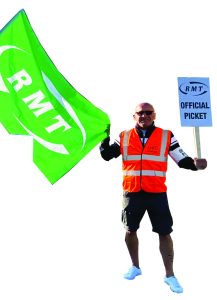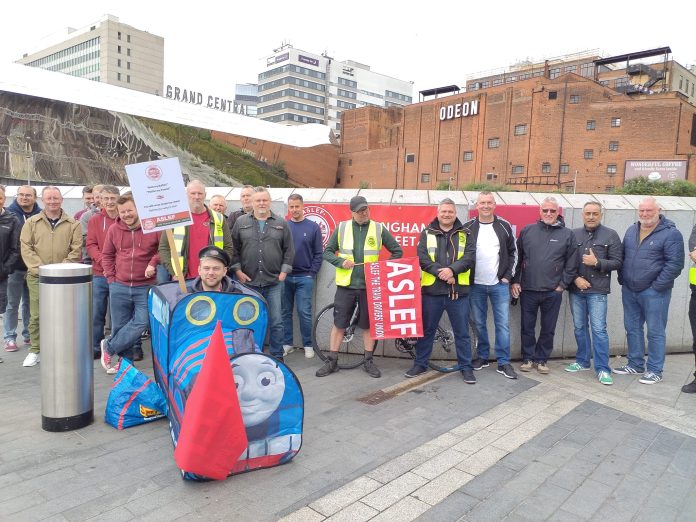Heather Rawling reports from Leicester
There was confidence and gritty determination on Aslef and RMT picket lines, helped by support from public. Rail union RMT struck on 2 June; train drivers’ union Aslef on 31 May and 3 June.
RMT member Nigel said: “I can still see us being here at Christmas.”
An RMT guard said that passengers, seeing his RMT badge, often comment that they support the strikes.
On Aslef picket lines, passengers were turning up having been sold tickets online that morning, despite Leicester station being completely shut. They were angry with the train company for selling the tickets and supported the strikers. Two of them bought a copy of the Socialist.
Aslef members were also prepared for a long battle, with both sides in the dispute digging in. There was a mood for coordination among the strikers.
Aslef strikers at New Street station spoke to Birmingham Socialist Party members
At Birmingham New Street, one striking rail worker told us: “This strike isn’t just about our pay and conditions now, but protecting jobs and conditions on the railway for years to come. I hate to think what things could be like in 30 years if we lose this.”
Other strikers told us: “Right-wing news rags are trying to turn key workers against each other, and use train drivers as a scapegoat for the Tories making a mess of the railways.
“People think this job is just pressing a button and could be automated. But less than half of this country’s railway is electrified, and some lines still use Victorian signalling!
“Our union financially supports Labour, but Sir Keir Starmer doesn’t want to support us!”
An Aslef member in Devon spoke to Tobias Robshaw
“The media want to say it’s all about pay, but it’s about the working conditions that the union has fought for, for decades, that’s the main reason we’re here. The other reason is to stand up to this corrupt Tory government. That might not be the union’s view, but it is mine.
“They want to make changes to our rostering process so it’s done centrally by the company, instead of having our involvement, where every timetable change we can scrutinise the diagrams they give us, and check they match our terms and conditions, such as maximum driving hours. We have to have scheduled breaks at certain times depending on the length of the job, that’s a big one for us.
“We’ve not actually seen the fine detail, we get bits and pieces from the higher-ups in the union, but there was talk of overruling arrangements on monitoring our sickness. So that is a red line for us straight away.
“They offered us 4% pay rise for both years, so that straight away was a slap in the face as well. We’ve not had a pay rise in four years.
“Welsh Aslef negotiated a 20% rise over two years, plus RPI inflation in the third. Negotiating with Transport for Wales, they got a much better deal than we are getting with the Tory government in Westminster.
“An important aspect for those on strike is the mystery of what exactly is meant by ‘general reforms’. Potentially that could mean they want to increase our working hours. Do they want to reduce our leave, or enforce more continuous driving time?
“It’s a big movement now, over the last 12 months. It started off with the RMT, it’s snowballed now, everyone’s backing each other. I’ve been stood on picket lines for the BT guys, the post office; we get all sorts coming down to support us, students, there’s big solidarity.”
Paul Reilly former RMT NEC: Why I’m going to NSSN conference
Solidarity and coordination never been more important
Paul Reilly, former RMT NEC member
During this last 12 months, I have been heavily involved in organising and campaigning, both on a personal level as a worker affected by the dispute, and also as an RMT representative, branch secretary and activist.
This was the first time in my 30+ years as an RMT member that we have had a national rail strike with all sectors of the railway industry in dispute. Not only against the companies involved, but with the Tory government, hell-bent on pushing through with reforms to attack our terms and conditions, jobs and wages.
The NSSN was originally formed by the RMT back in 2006 when the late, great Bob Crow was at the helm, with the aim of bringing together grassroots trade union activists and reps from all industries and trade unions to work together in support of each other’s struggles.
If this last year has shown us anything, it’s that workers’ solidarity and coordination has never been more important. By supporting each other and encouraging workers, most of whom have never been involved in industrial disputes in their lives, never mind attending picket lines, we have reinvigorated working-class unity and trade union activism, making our movement stronger in the process.
This is exactly why I will be attending this year’s NSSN conference and why I’ll be encouraging many other trade union activists from across the rail industry and from other industries to do the same.
Let’s make this the biggest one yet!

Come to NSSN conference
11am – 4.30pm, 24 June at Conway Hall, London. Registration fee £6
Confirmed speakers so far: NIPSA General Secretary Carmel Gates, BFAWU General Secretary Sarah Woolley, POA General Secretary Steve Gillan, NAPO National Official Annoesjka Valent, GMB Officer Gary Palmer from the victorious #GMBThree








